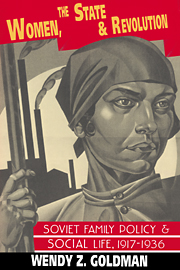Book contents
- Frontmatter
- Contents
- List of tables
- Acknowledgments
- 1 The origins of the Bolshevik vision: Love unfettered, women free
- 2 The first retreat: Besprizornost' and socialized child rearing
- 3 Law and life collide: Free union and the wage-earning population
- 4 Stirring the sea of peasant stagnation
- 5 Pruning the “bourgeois thicket”: Drafting a new Family Code
- 6 Sexual freedom or social chaos: The debate on the 1926 Code
- 7 Controlling reproduction: Women versus the state
- 8 Recasting the vision: The resurrection of the family
- Conclusion: Stalin's oxymorons: Socialist state, law, and family
- Index
- Soviet and East European Studies
5 - Pruning the “bourgeois thicket”: Drafting a new Family Code
Published online by Cambridge University Press: 26 March 2010
- Frontmatter
- Contents
- List of tables
- Acknowledgments
- 1 The origins of the Bolshevik vision: Love unfettered, women free
- 2 The first retreat: Besprizornost' and socialized child rearing
- 3 Law and life collide: Free union and the wage-earning population
- 4 Stirring the sea of peasant stagnation
- 5 Pruning the “bourgeois thicket”: Drafting a new Family Code
- 6 Sexual freedom or social chaos: The debate on the 1926 Code
- 7 Controlling reproduction: Women versus the state
- 8 Recasting the vision: The resurrection of the family
- Conclusion: Stalin's oxymorons: Socialist state, law, and family
- Index
- Soviet and East European Studies
Summary
The period of human struggle and war will become a matter of legend…. Coercion will begin to disappear in relations between people. Law, as the instrument of coercion in human relations, as the expression of constant struggle between individuals, groups, and the state, will also disappear. With the decisive consolidation of collectivism, not only civil law, but all law will disappear. The harmonious existence of people will be built not on the basis of social coercion and social necessity – in other words, law – but on the basis of full social freedom.
A.G. Goikhbarg, 1918Throughout the early 1920s, jurists tried repeatedly to reform the Family Code of 1918. Prompted by the more radical proponents of free union, as well as the need to redress the social problems of NEP, the Commissariats of Justice and Internal Affairs prepared several drafts of a new Family Code. Their efforts were clearly influenced by Evgeny Pashukanis, a young Marxist jurist, whose ideas on the origins of law dominated Soviet jurisprudence after 1924. Pashukanis's work on the withering away of the law provided a powerful, comprehensive framework for those who sought to hasten the withering away of the family. The process of drafting the new Family Code clearly bore the stamp of his thinking. With each successive draft, the jurists further pared the provisions of the Code and minimized the role of law. The final draft, which was submitted for nationwide debate in 1925, was considerably shorter and sparer than the 1918 original.
- Type
- Chapter
- Information
- Women, the State and RevolutionSoviet Family Policy and Social Life, 1917–1936, pp. 185 - 213Publisher: Cambridge University PressPrint publication year: 1993

